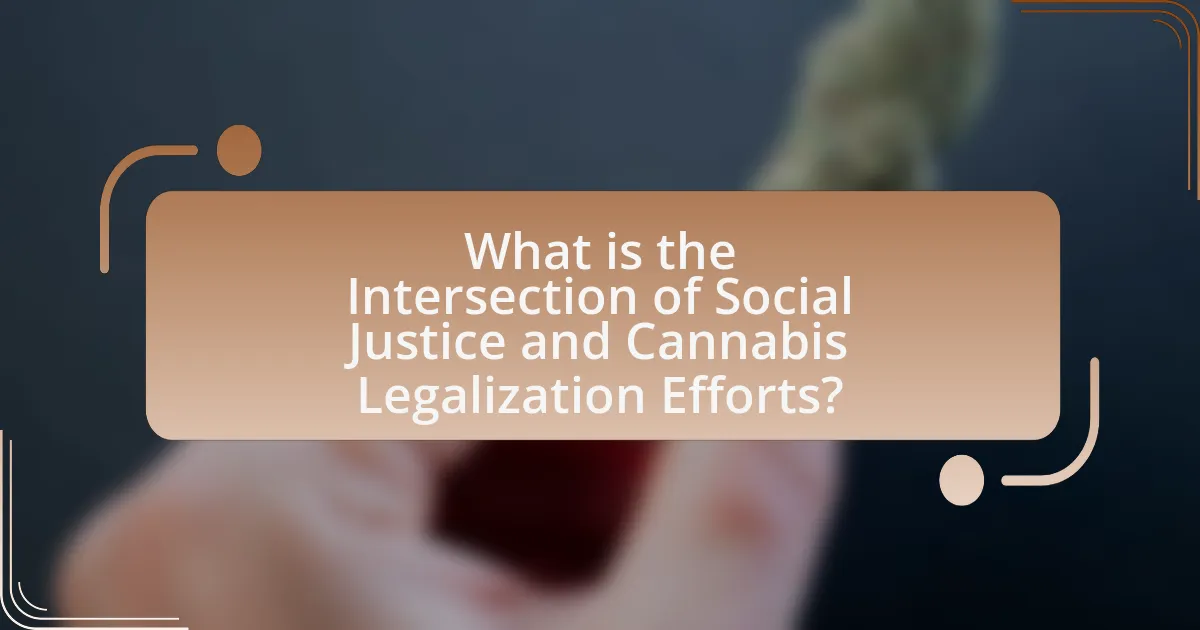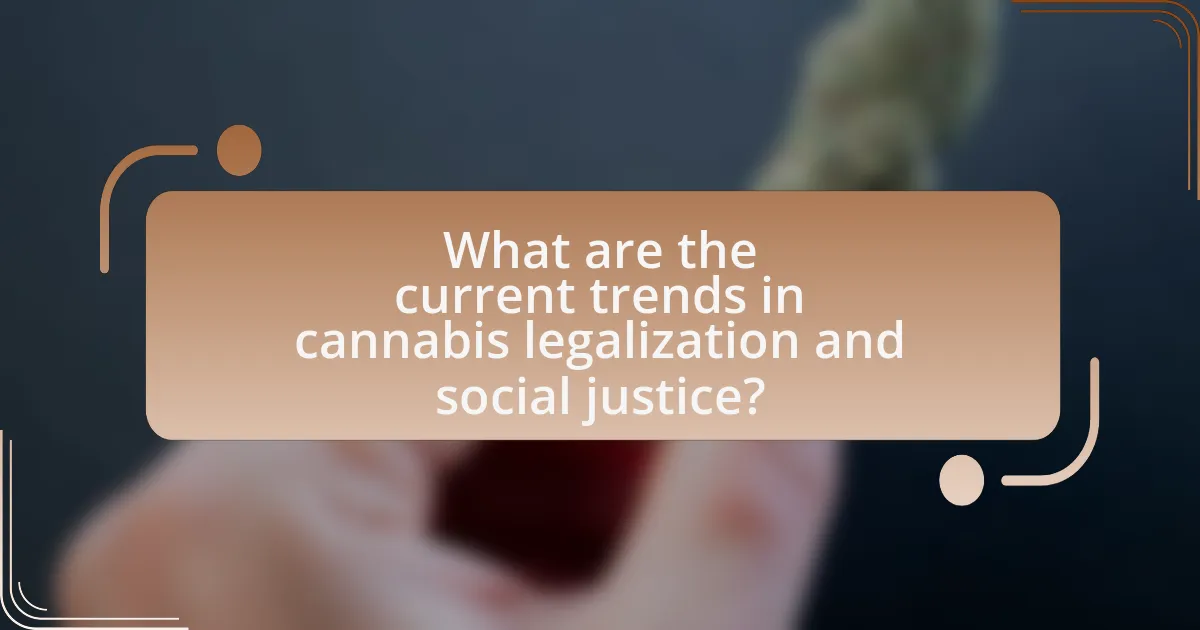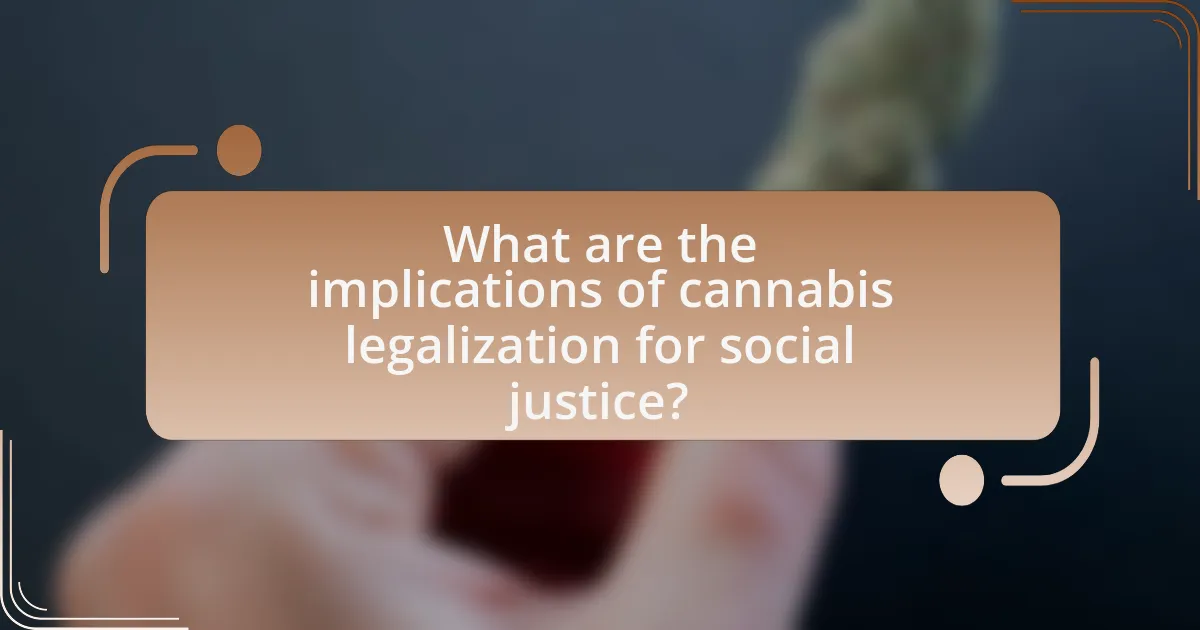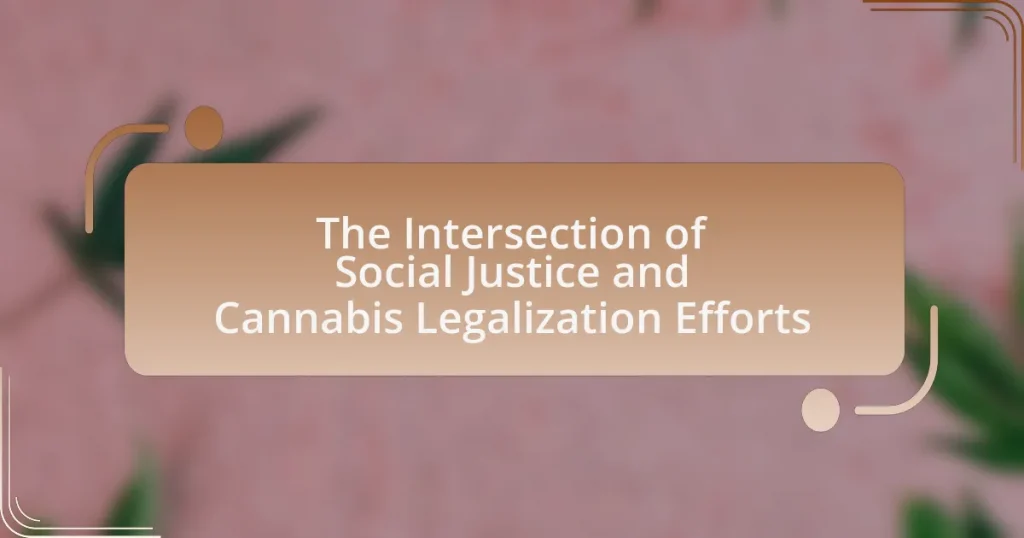The article examines the intersection of social justice and cannabis legalization efforts, highlighting the historical injustices and racial disparities linked to cannabis prohibition. It discusses how legalization advocates aim to rectify the disproportionate impact on marginalized communities, particularly Black and Latino populations, who face higher arrest rates for cannabis offenses despite similar usage rates. Key topics include the need for equitable policies, the role of social equity initiatives in cannabis reform, and the impact of recent legislative changes on social justice outcomes. The article also addresses the challenges faced by advocates and the importance of community engagement in shaping inclusive cannabis regulations.

What is the Intersection of Social Justice and Cannabis Legalization Efforts?
The intersection of social justice and cannabis legalization efforts lies in addressing the historical injustices and racial disparities associated with cannabis prohibition. Legalization advocates argue that ending prohibition can rectify the disproportionate impact on marginalized communities, particularly Black and Latino populations, who have faced higher arrest rates for cannabis-related offenses despite similar usage rates among racial groups. For instance, a 2020 report from the American Civil Liberties Union (ACLU) highlighted that Black individuals are 3.64 times more likely to be arrested for cannabis possession than white individuals, underscoring the need for equitable policies. Additionally, many legalization efforts now include provisions for expunging past convictions and reinvesting tax revenues into affected communities, further emphasizing the link between social justice and cannabis reform.
How do social justice issues relate to cannabis legalization?
Social justice issues are closely related to cannabis legalization as the criminalization of cannabis has disproportionately affected marginalized communities, particularly people of color. Research indicates that despite similar usage rates, Black individuals are arrested for cannabis offenses at nearly four times the rate of white individuals in the United States. This disparity highlights systemic inequalities in law enforcement and judicial processes. Legalizing cannabis can address these injustices by reducing arrests, expunging criminal records, and creating economic opportunities in communities that have been adversely impacted by prohibition. Furthermore, many legalization efforts now include provisions for social equity, aiming to ensure that those most affected by past cannabis laws can benefit from the legal market.
What historical injustices have influenced cannabis policies?
Historical injustices that have influenced cannabis policies include the criminalization of cannabis during the early 20th century, which disproportionately targeted marginalized communities, particularly Black and Latino populations. The Marihuana Tax Act of 1937 marked a significant turning point, as it was rooted in racial prejudice and aimed at suppressing these communities under the guise of public health concerns. Additionally, the War on Drugs initiated in the 1980s further exacerbated these injustices, leading to mass incarceration and systemic discrimination against people of color. Statistics show that despite similar usage rates, Black individuals are arrested for cannabis offenses at a rate four times higher than white individuals. These historical contexts have shaped contemporary cannabis policies, often perpetuating inequalities rather than addressing them.
How do marginalized communities experience the impacts of cannabis prohibition?
Marginalized communities experience the impacts of cannabis prohibition through increased criminalization, economic disadvantage, and social stigma. The enforcement of cannabis laws disproportionately targets individuals from these communities, leading to higher arrest rates; for instance, Black individuals are nearly four times more likely to be arrested for cannabis possession than white individuals, despite similar usage rates. This criminalization results in long-term consequences, including barriers to employment, housing, and education due to criminal records. Additionally, the economic disadvantages are exacerbated as these communities often lack access to the legal cannabis market, which has been shown to generate significant revenue; a report from the Drug Policy Alliance indicates that legal cannabis markets can create jobs and economic opportunities that marginalized communities are often excluded from. Thus, cannabis prohibition perpetuates systemic inequalities, reinforcing cycles of poverty and disenfranchisement.
Why is cannabis legalization considered a social justice issue?
Cannabis legalization is considered a social justice issue because it addresses the disproportionate impact of drug enforcement laws on marginalized communities. Historical data shows that despite similar usage rates, Black and Latino individuals are significantly more likely to be arrested for cannabis-related offenses compared to their white counterparts. For instance, a 2020 report from the American Civil Liberties Union revealed that Black individuals are 3.64 times more likely to be arrested for cannabis possession than white individuals, highlighting systemic racial disparities in law enforcement. Legalizing cannabis aims to rectify these injustices by reducing arrests, expunging criminal records, and promoting equitable access to the cannabis industry for those previously affected by prohibition.
What are the arguments for social equity in cannabis legalization?
The arguments for social equity in cannabis legalization center on addressing historical injustices and promoting fairness in the cannabis industry. Social equity initiatives aim to rectify the disproportionate impact of cannabis prohibition on marginalized communities, particularly communities of color, who have faced higher arrest rates and harsher penalties for cannabis-related offenses. For instance, a 2020 report from the American Civil Liberties Union revealed that Black individuals are nearly four times more likely to be arrested for cannabis possession than white individuals, despite similar usage rates.
Additionally, social equity programs often include provisions for expunging past cannabis convictions, providing access to business licenses, and offering financial assistance or training for individuals from affected communities. These measures are designed to create opportunities for economic participation and to ensure that the benefits of legalization are shared equitably. By implementing social equity frameworks, states can foster a more inclusive cannabis market that acknowledges and seeks to remedy the harms caused by previous drug policies.
How can cannabis legalization address systemic inequalities?
Cannabis legalization can address systemic inequalities by reducing the disproportionate impact of drug enforcement on marginalized communities. Legalization allows for the expungement of criminal records related to cannabis offenses, which disproportionately affect people of color; for instance, a 2020 report from the American Civil Liberties Union found that Black individuals are 3.64 times more likely to be arrested for cannabis possession than white individuals, despite similar usage rates. Additionally, legalization can create economic opportunities in the cannabis industry for those previously affected by prohibition, as seen in states like California, where social equity programs aim to provide licenses and funding to individuals from communities harmed by the war on drugs. These measures can help rectify historical injustices and promote equity in access to economic resources.
What role do activists play in the intersection of social justice and cannabis legalization?
Activists play a crucial role in advocating for social justice within the context of cannabis legalization by highlighting the disproportionate impact of cannabis prohibition on marginalized communities. They work to raise awareness about the historical injustices associated with cannabis criminalization, such as racial disparities in arrest rates; for instance, Black individuals are nearly four times more likely to be arrested for cannabis-related offenses than white individuals, despite similar usage rates. Activists also push for policy reforms that not only legalize cannabis but also include measures for expunging past convictions and ensuring equitable access to the legal cannabis market for those affected by previous laws. Their efforts are essential in shaping legislation that addresses both the legal status of cannabis and the social equity implications tied to its legalization.
Who are the key figures advocating for social justice in cannabis reform?
Key figures advocating for social justice in cannabis reform include activists like Michelle Alexander, who emphasizes the racial disparities in drug enforcement, and organizations such as the Drug Policy Alliance, which works to promote equitable cannabis policies. Additionally, politicians like Senator Cory Booker have introduced legislation aimed at addressing the injustices of the War on Drugs. These individuals and groups highlight the need for reform to rectify historical injustices and promote equity in the cannabis industry.
What strategies do activists use to promote social equity in cannabis laws?
Activists promote social equity in cannabis laws through strategies such as advocacy for legislative reform, community engagement, and education initiatives. These strategies aim to address the historical injustices of cannabis prohibition, particularly its disproportionate impact on marginalized communities. For instance, activists often lobby for policies that include expungement of past cannabis convictions, equitable access to licensing for cannabis businesses, and reinvestment in communities affected by the war on drugs. Research indicates that states implementing social equity programs, like Illinois, have seen increased participation from minority-owned businesses in the cannabis industry, highlighting the effectiveness of these strategies in promoting equity.

What are the current trends in cannabis legalization and social justice?
Current trends in cannabis legalization emphasize the integration of social justice initiatives, particularly in addressing the disparities caused by past drug policies. Many states are now incorporating measures to expunge criminal records for individuals previously convicted of cannabis-related offenses, recognizing the disproportionate impact of these laws on marginalized communities. For instance, states like California and Illinois have implemented automatic expungement processes, reflecting a growing acknowledgment of the need for restorative justice in cannabis legislation. Additionally, there is a push for equitable access to the cannabis industry, with policies aimed at supporting minority-owned businesses and ensuring that communities adversely affected by prohibition benefit from legalization. This trend is supported by research from the Drug Policy Alliance, which highlights the importance of prioritizing social equity in cannabis reform to rectify historical injustices.
How have recent legislative changes impacted social justice initiatives?
Recent legislative changes have significantly advanced social justice initiatives by addressing systemic inequalities, particularly in the context of cannabis legalization. For instance, states like California and Illinois have implemented laws that not only legalize cannabis but also include provisions for expunging past convictions related to cannabis offenses. These measures aim to rectify the disproportionate impact of drug laws on marginalized communities, as evidenced by data showing that Black individuals are arrested for cannabis-related offenses at rates much higher than their white counterparts. Furthermore, the allocation of tax revenue from cannabis sales to community programs enhances funding for education, health services, and economic development in these communities, thereby promoting equity and social justice.
What states have implemented social equity programs in cannabis legalization?
States that have implemented social equity programs in cannabis legalization include California, Illinois, Massachusetts, New Jersey, and New York. These states have established frameworks aimed at addressing the historical injustices related to cannabis prohibition, providing opportunities for individuals from communities disproportionately affected by the war on drugs. For instance, Illinois’s program includes provisions for expunging criminal records and prioritizing licenses for applicants from impacted areas, reflecting a commitment to social equity in the cannabis industry.
How effective are these programs in promoting social justice?
These programs are effective in promoting social justice by addressing historical injustices related to cannabis prohibition. Research indicates that states implementing social equity programs, such as those providing financial assistance and licensing opportunities to marginalized communities, have seen increased participation from these groups in the cannabis industry. For example, a study by the Drug Policy Alliance highlights that states like Illinois and California have established frameworks aimed at reducing barriers for individuals impacted by the war on drugs, resulting in a more equitable distribution of cannabis business licenses. This evidence supports the assertion that targeted programs can significantly enhance social justice outcomes within the context of cannabis legalization.
What challenges do social justice advocates face in cannabis legalization efforts?
Social justice advocates face significant challenges in cannabis legalization efforts, primarily due to systemic inequalities and regulatory barriers. These advocates often encounter opposition from established political and economic interests that benefit from the status quo, which can hinder progress toward equitable legalization. Additionally, the historical criminalization of cannabis disproportionately affects marginalized communities, complicating efforts to ensure that legalization includes restorative justice measures. For instance, a report by the American Civil Liberties Union highlights that Black individuals are nearly four times more likely to be arrested for cannabis possession than white individuals, underscoring the need for advocates to address these disparities in their campaigns. Furthermore, the lack of access to capital and resources for minority-owned cannabis businesses poses another obstacle, as these advocates strive to create an inclusive industry that reflects the diversity of those most impacted by cannabis prohibition.
What barriers exist to achieving equitable cannabis policies?
Barriers to achieving equitable cannabis policies include systemic racism, lack of access to capital for marginalized communities, and inconsistent regulatory frameworks. Systemic racism has historically led to disproportionate enforcement of cannabis laws against people of color, resulting in criminal records that hinder economic opportunities. Additionally, marginalized communities often face challenges in accessing funding and resources necessary to participate in the legal cannabis market, which is dominated by well-funded corporations. Inconsistent regulatory frameworks across states create confusion and inequities, making it difficult for small businesses and individuals from disadvantaged backgrounds to navigate the legal landscape. These factors collectively impede the establishment of fair and just cannabis policies.
How do public perceptions of cannabis affect social justice initiatives?
Public perceptions of cannabis significantly influence social justice initiatives by shaping policy decisions and funding allocations. When the general public views cannabis positively, it often leads to increased support for legalization efforts, which can result in the decriminalization of cannabis-related offenses and the expungement of criminal records for individuals previously convicted of such offenses. For instance, a 2021 Gallup poll indicated that 68% of Americans support legalizing cannabis, reflecting a shift in societal attitudes that can drive legislative changes aimed at rectifying past injustices associated with cannabis prohibition. This shift can also lead to the allocation of resources towards communities disproportionately affected by the War on Drugs, thereby promoting equity and justice in the cannabis industry.

What are the implications of cannabis legalization for social justice?
Cannabis legalization has significant implications for social justice, primarily by addressing historical injustices related to drug enforcement. Legalization can reduce the disproportionate impact of cannabis prohibition on marginalized communities, where arrest rates for cannabis offenses have historically been higher. For instance, a 2020 report from the American Civil Liberties Union found that Black individuals are 3.64 times more likely to be arrested for cannabis possession than white individuals, despite similar usage rates. Furthermore, legalization can facilitate the expungement of past cannabis-related convictions, allowing individuals to reintegrate into society without the stigma of a criminal record. This process can enhance economic opportunities and reduce barriers to employment, housing, and education for those previously affected by cannabis laws. Overall, cannabis legalization serves as a tool for promoting equity and rectifying systemic inequalities within the justice system.
How does cannabis legalization impact criminal justice reform?
Cannabis legalization significantly impacts criminal justice reform by reducing arrests and incarceration rates for non-violent drug offenses. In states where cannabis has been legalized, studies show a marked decrease in marijuana-related arrests; for example, in Colorado, marijuana arrests dropped by over 80% following legalization in 2012. This reduction not only alleviates the burden on the criminal justice system but also addresses racial disparities, as minority communities have historically faced disproportionate enforcement of cannabis laws. Furthermore, legalization allows for the reallocation of law enforcement resources towards more serious crimes, enhancing overall public safety.
What changes occur in arrest rates following legalization?
Following legalization, arrest rates for cannabis-related offenses typically decline significantly. For instance, a study conducted in Colorado after the legalization of recreational cannabis in 2012 showed a 50% decrease in marijuana possession arrests by 2018. Additionally, states that have legalized cannabis often report reductions in racial disparities in arrest rates, as evidenced by data from the American Civil Liberties Union, which indicated that Black individuals were disproportionately arrested for cannabis offenses prior to legalization. These changes highlight the impact of legalization on reducing both overall arrest rates and addressing social justice issues related to cannabis enforcement.
How does legalization affect sentencing and incarceration rates for cannabis-related offenses?
Legalization of cannabis significantly reduces sentencing and incarceration rates for cannabis-related offenses. In jurisdictions where cannabis has been legalized, studies show a marked decrease in arrests and convictions for possession and use, leading to lower incarceration rates. For instance, a report by the American Civil Liberties Union (ACLU) indicated that states with legalized cannabis experienced a 50% reduction in cannabis-related arrests compared to states where it remains illegal. Additionally, a 2020 study published in the journal “Health Affairs” found that legalization correlates with a decline in racial disparities in cannabis arrests, further supporting the notion that legalization positively impacts sentencing and incarceration rates.
What economic opportunities arise from cannabis legalization for marginalized communities?
Cannabis legalization creates significant economic opportunities for marginalized communities by enabling access to new markets and reducing barriers to entry in the cannabis industry. This includes job creation in cultivation, distribution, and retail sectors, which can provide stable employment and income for individuals in these communities. For instance, a report from the Minority Cannabis Business Association indicates that minority-owned cannabis businesses are more likely to employ individuals from their communities, thus fostering economic growth locally. Additionally, legalization can lead to increased tax revenues that can be reinvested into community services, education, and infrastructure, further enhancing economic stability and development.
How can cannabis businesses contribute to community development?
Cannabis businesses can contribute to community development by creating jobs, generating tax revenue, and supporting local initiatives. These businesses often employ local residents, which helps reduce unemployment rates; for example, the cannabis industry in Colorado created over 18,000 jobs by 2020. Additionally, cannabis businesses contribute significant tax revenue that can be reinvested into community services, such as education and infrastructure. In California, cannabis tax revenue exceeded $1 billion in 2021, funding various community programs. Furthermore, many cannabis companies engage in corporate social responsibility by supporting local charities and community projects, thereby fostering a positive relationship with the community and addressing social equity issues related to past cannabis prohibition.
What are the potential risks of economic disparities in the cannabis industry?
Economic disparities in the cannabis industry pose significant risks, including perpetuating social inequality and limiting access to opportunities for marginalized communities. These disparities can lead to a concentration of wealth and power among a few large corporations, which may stifle competition and innovation from smaller, diverse businesses. For instance, a report by the Brookings Institution highlights that minority-owned businesses face systemic barriers in accessing capital and licenses, resulting in a lack of representation in the market. Additionally, economic disparities can exacerbate existing social injustices, as communities disproportionately affected by past cannabis prohibition may not benefit from legalization, further entrenching cycles of poverty and disenfranchisement.
What best practices can be implemented to ensure social justice in cannabis legalization?
To ensure social justice in cannabis legalization, implementing equitable access to licenses for marginalized communities is essential. This practice addresses historical injustices by prioritizing individuals from communities disproportionately affected by past cannabis prohibition. For instance, states like Illinois have established social equity programs that provide financial assistance and training for applicants from these communities, aiming to create a more inclusive industry. Additionally, allocating a portion of tax revenue from cannabis sales to fund community programs, such as drug treatment and education, further supports social justice initiatives. Research indicates that such measures can significantly reduce disparities and foster economic opportunities for historically marginalized groups.
How can policymakers create inclusive cannabis regulations?
Policymakers can create inclusive cannabis regulations by actively involving marginalized communities in the legislative process. This can be achieved through public consultations, stakeholder meetings, and advisory boards that represent diverse voices, particularly those historically impacted by cannabis prohibition. Research indicates that states like California have implemented community reinvestment grants to support those affected by the war on drugs, demonstrating a model for integrating social equity into cannabis policy. Additionally, establishing equitable licensing processes that prioritize applicants from disadvantaged backgrounds can further ensure inclusivity.
What role does community engagement play in successful cannabis reform?
Community engagement is crucial for successful cannabis reform as it ensures that the voices of affected populations are heard and considered in policy-making. Engaging communities fosters trust, promotes transparency, and encourages collaboration between stakeholders, which is essential for addressing historical injustices related to cannabis prohibition. For instance, research from the Drug Policy Alliance highlights that inclusive community dialogues can lead to more equitable policies that prioritize social equity and reparative justice, ultimately resulting in reforms that reflect the needs and values of the community.


